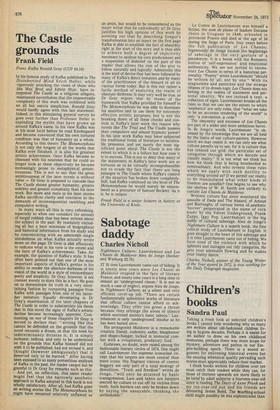Sabotage daddy
Charles Nicholl
Nightmare Culture: Lautreamont and Les Chants de Maldoror Alex de Jonge (Secker and Warburg £2.75) IT IS time Lautr6amont came out of hiding. It is ninety nine years since Les Chants de Maldoror erupted in the face of literary France, and ninety nine years is a long time to remain an 'underground classic.' It is not so much a case of neglect, argues Alex de Jonge, in Nightmare Culture, as a silent and very efficient cover-up job. "There are certain fundamentally subversive works of literature that official culture cannot afford to acknowledge. They offer too great a threat because they infringe the areas of silence which surround society's basic taboos." Lautr6amont is only 'underground' insofar as he has been buried alive.
His protagonist Maldoror is a remarkable creation. Dandy, sodomite, sadist, blasphemer and shape-changer, locked in immortal combat with a voluptuous, predatory God.
Eyebrows, no doubt, were raised among the fashionable literary circles of 1874. One might call Lautreamont the supreme iconoclast except that his targets are more central than mere icons. His flagrant visions of cosmic buggery are only part of a total strategy of demolition. "Truth and freedom" writes de Jonge, "will only be attained by basic transgression. Law and taboo are barriers erected by culture to cut off its victims from truth, Such barriers can only be broken down by saying the unsayable, thinking the unthinkable."
Le Comte de Lautreamont was himself a fiction, the nom de plume of Isadore Ducasse (born in Uruguay in 1846, schooled in provincial France and died at the age of 24 during the Seige of Paris, four years before the full publication of Les Chants). Ingeniously de Jonge locates the beginnings of sabotage in the very gesture of a pseudonym. It is a break with the Romantic notion of 'self-expression' and emotional authenticity. We are not invited to reconstruct Les Chants in terms of a historical personality. "Poetry" wrote Lautr6amont "should be written by all, not by one." With its plagiarisms and pastiches and the strange ellipses of its dream-logic Les Chants does not belong in the realms of statement and personal identity. We see instead a text, a collection of signs. Lautrdamont breaks all the rules so that we can see the extent to which 'aesthetics' are only rules, that "what we take to be an accurate rendering of the world" is only "a convention, a code."
The obscenity and excesses of Les Chants are part of a wider and more ambitious havoc. In de Jonge's words, Lautrdamont "is obsessed by the knowledge that we are all held by the limits of our culture-pattern. However much we may resent it, we can only see what culture permits us to see, for it is culture that has created our grid, the particular set of categories through which we decode and classify reality." It is not what we think but how we think that is being bombarded so remorselessly. And who invents these rules which we apply with such docility to everything around us? If we permit our reality to be manipulated what other kinds of. freedom are possible? One begins to see why the shelves of W. H. Smith are unlikely to contain Les Chants de Maldoror.
Western culture has since weathered the assaults of Dada and The Absurd, of Artaud and Burroughs, of various forms of. aesthetic 'bovver' perpetrated in the name of rock music by the Velvet Underground, Frank Zappa, Iggy Pop. Lautrdamont is the big daddy of cultural sabotage. Alex de Jonge's Nightmare Culture is a superb book, the first critical study of Lautrdamont in English. It goes straight to the heart of this sabotage and it is time Lautrdamont came out of hiding. We have need of the violence with which he splinters and outrages our tidy categories. He gets your adrenalin flowing and he makes your reality dance.
Charles Nicholl, winner of the Young Writer of the Year award in 1972, is now working for the Daily Telegraph magazine.


































 Previous page
Previous page